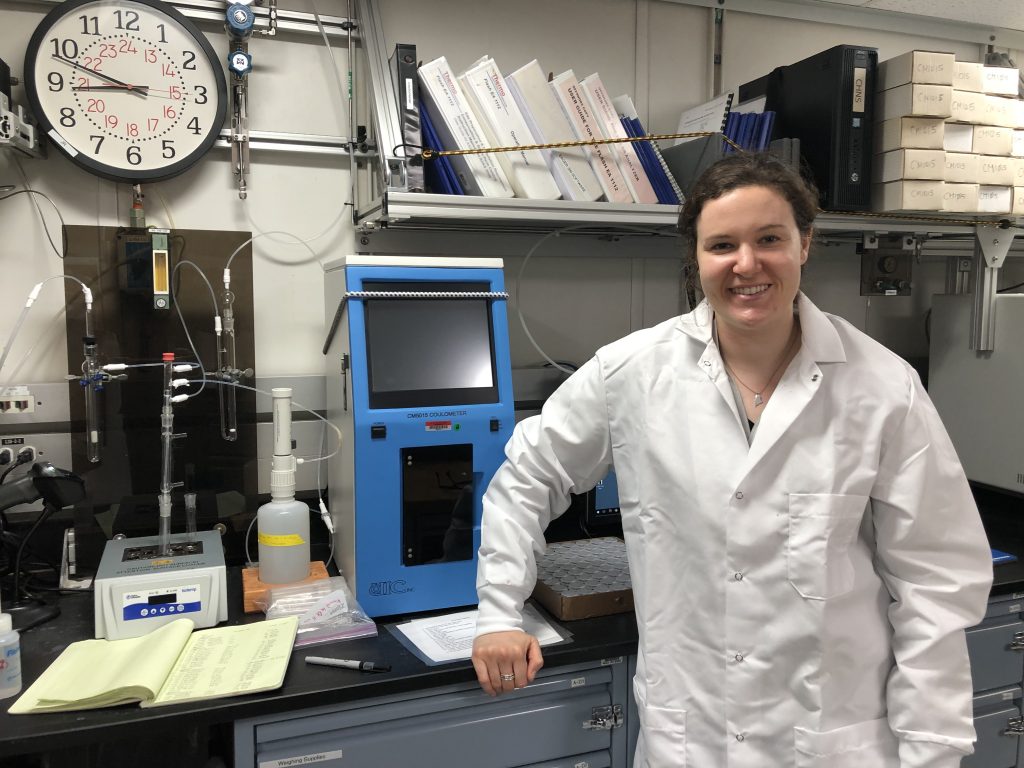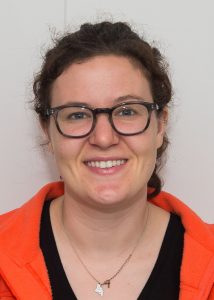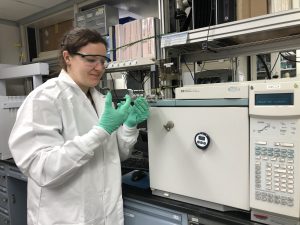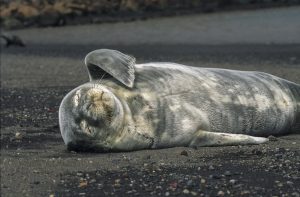
Career Spotlight: Organic Geochemist Rebecca Smith

-Worked on the JR before: No
Rebecca Smith Interview
Please describe your job duties while on the JR. What will you be doing on a daily basis?
-
-
-
-
-
-
-
-
- As an organic geochemist, I quantify hydrocarbon headspace gases in each core, including methane (CH4) and ethane (C2H6). These gases can cause a safety risk in high concentrations, so we monitor them to make sure levels are low enough to continue drilling. Additionally, I measure total organic carbon content (TOC) and concentration of calcium carbonate (CaCO3) at several depths along each core.
-
-
-
-
-
-
-
Describe one instrument or tool that is essential for you to do your job? Or a piece of equipment on the JR that is useful and why – what does it do?
-
-
-
-
-
-
-
-
- I rely on gas chromatography to quantify concentrations of hydrocarbons in a given core. These hydrocarbons serve as a potential safety risk when in high enough concentrations, so being able to quantify them in a given core allows drilling to proceed safely.
-
-
-
-
-
-
-
Why is your work (or research) important? What question are you trying to answer or how does your work/research help assist/advance scientific knowledge?
- In order to predict the effects of future climate change, it is important to reconstruct forcing mechanisms during periods in Earth’s history when CO2 concentrations were as high as they are today. One critical forcing mechanism, global thermohaline circulation, can be analyzed by reconstructing changes in sea surface temperatures at a given location through time. As a biogeochemist, I reconstruct ocean temperatures over millions of years by measuring the distributions of lipid compounds produced by marine organisms and preserved in IODP cores. These distributions, also known as biomarkers, can indicate the sea surface temperatures at which the source organisms once lived. After this expedition, I aim to determine how sea surface temperatures changed in the Pacific Sector of the Southern Ocean over the past 5 million years. This information will shed light on changes in Antarctic Circumpolar Current behavior across the mid-Pliocene, which serves a common analogue period for modern climate change.

Why the ocean? What made you choose a career at sea or career that involves the ocean?
- I grew up in South Freeport, a small fishing village off the coast of Southern Maine, where I sailed each summer and grew a strong appreciation for the ocean. Its vastness and mystery intrigued me from a young age, and now as a marine paleoclimatologist, I have the opportunity to delve into scientific research while living at sea. The ocean serves as a giant conveyer belt transporting heat all around the world, and as such it exerts a critical control on global climate. To study how climate changes today, we need to study how this conveyer belt behaved over geologic history. Overall, it was both my love for the ocean and its significant influence on climate change that led me to this career.
What are you most excited about for this expedition and/or being on the JR?
- I am most excited to see the moon pool when drilling is in action, and to star gaze on calm nights.
What are three things you think are needed for a successful expedition at sea? And Why!
- Reminders of home (letters, pictures, etc.), a computer for emailing and watching movies, and a sense of adventure and perseverance!
What is your favorite sea creature and why?
- My favorite sea creature are seals, because they are the dogs of the sea.

When did you know you wanted to pursue a career in science or an ocean science career?
- I knew I wanted to pursue a career in science after learning about coprolites. For those that don’t know, coprolites are fossilized poop. I wrote a college essay about how scientists can analyze ground sloth coprolites to reconstruct paleo-environmental conditions at the time those sloths once lived, and it blew my mind! I knew I wanted to pursue a career in ocean science more specifically after learning that marine sediments date back to a time when CO2 was as high as it is today. I wanted to study those periods, to hopefully improve our understanding of similar-to-modern climates and better predict the effects of future climate change.
What do you personally hope to gain or experience while on EXP383?
- I hope to develop a daily work rhythm during this expedition, and really immerse myself in the science. I also hope to build friendships with scientists and crew onboard, and see lots of marine life.
What message do you have for anyone considering a career at sea or a career involving the ocean sciences?
- DO IT! It is a unique opportunity to study both small scale and large scale environmental changes. Plus, when you study and reconstruct climate over millions of years, you essentially become a time traveler… pretty cool, no?
What do you do back home when not on the JR?
- I am a PhD student at UMass Amherst in the Department of Geosciences. When not at work, I like to spend time with my girlfriend, my friends and my family, mainly playing board games or eating yummy food.
Do you get sea sick? If yes or sometimes, please also select the other tab and describe how you cope with it.
- Yes: I never really had been sea sick until this expedition, but I do often get car sick. I cope with it by taking deep breaths. I picture myself outside of the boat looking at the waves rising and falling, and it makes the motion sickness much less severe. Laying down always helps, as does sleeping.
The need for space comes in many forms. Which type of space, in general, is the most important to you?
- ___Personal Space
- ___Creative Space
- _X_Outdoor Space
- ___Emotional Space
- ___Physical Space
- ___Spiritual or Meditative
- ___Outer Space
- ___Community Space
- ___Quite Space
- ___Productive/Work Space
- ___Digital/Virtual Space
- ___Public Space
- ___Inner Space
- ___Other:
Why that type of space? What makes it important to you and will it be available while on the JR?
- All of these are so important for me, and the JR makes it possible to obtain them all. I think outdoor, personal and community space are the most important of those though, if I had to choose. I need personal space during my off time to reset my energy and get rest. I also need community space to socialize. I need outdoor space to star gaze, look at the horizon, and meditate.